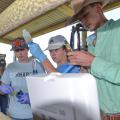About 4-H
![]()
The 4-H Youth program strives to improve the quality of life for Mississippi 4-H'ers by developing the potential of young people and by providing "hands-on" (experiential) educational programs. Program priorities identified include leadership development, life skills training, developing positive self-esteem, and empowering volunteers. Programs are delivered through local county Extension offices to volunteer leaders. Learn more about how to join.
The 4-H Symbol
4-H is best identified by its green four-leaf clover with an H on each leaf. The four Hs on this emblem stand for Head, Heart, Hands, and Health. These words emphasize the basis of the four-fold development of young people involved in 4-H.
Head: 4-H'ers focus on thinking, making decisions, and understanding and gaining knowledge.
Heart: 4-H'ers are concerned with the welfare of others and accept the responsibilities of citizenship and developing attitudes and values.
Hands: 4-H'ers use their hands to learn new skills and develop pride and respect for their own work.
Health: 4-H'ers develop and practice healthy living physically, mentally, spiritually, and socially.
The Four Essential Elements of 4-H
Mastery - By exploring 4-H projects and activities, 4-H'ers master skills to make positive career and life choices. 4-H provides a safe environment to make mistakes and receive feedback, and young people can discover their capabilities while meeting new challenges.
Generosity - By participating in 4-H community service and citizenship activities, 4-H'ers can connect to communities and learn to give back to others. These connections help young people find and fulfill their life's purpose.
Independence - By exercising independence through 4-H leadership opportunities, 4-H'ers mature in self-discipline and responsibility, learn to better understand themselves, and become independent thinkers.
Belonging - Through 4-H, young people can develop long-term consistent relationships with adults other than their parents and learn that they are cared about by and connected to others. 4-H gives young people the opportunity to feel physically and emotionally safe in a group setting.
4-H History
 |
 |
 |
4-H grew out of the progressive education movement in America in the late 1800s and early 1900s. Rural school principals and superintendents wanted to teach their students about the material they would need to succeed in the business world.
At the same time, agricultural colleges and experiment stations were accumulating scientific knowledge that could improve productivity and the standard of living for farmers, but farmers showed little interest in these "book farming" methods. These professors thought that teaching farmers' children improved agricultural methods might allow the information to reach the farmers.
Rural school principals and superintendents teamed with agricultural college researchers to form corn clubs in most eastern and southern states at this time.
W. H. "Corn Club" Smith was instrumental in forming Mississippi's first corn clubs. In 1907, Smith received a franking privilege and a salary of $1 per year from the United States Department of Agriculture. This was the first time the USDA had been involved in a youth program and established a three-way partnership of county, state, and federal governments working together.
While other states had corn clubs before Mississippi, none had the federal partnership Mississippi had. This is the basis of Mississippi's claim to be the birthplace of 4-H.
Publications
News
Riding ATVs is a blast! If you do it safely! If you want to have fun and lower the risk of having an accident, here are 10 safety tips to follow.
Handwashing can help prevent you and others from getting sick, but be sure you are washing the right way!
While Mississippi high school students have history, English and algebra on their schedules, several are now adding advanced animal husbandry skills to their academic load.
Brandi Karisch, beef cattle specialist with the Mississippi State University Extension Service, said Extension began offering a youth stockmanship competition this year to improve young participants’ knowledge and skills in beef cattle handling.
Success Stories
When it comes to losing weight, people need proven, reliable solutions. For Henry “Eddie” Robbins of Simpson County, Walk-a-Weigh offers that answer.
Hundreds of Mississippi 4-H’ers gathered at the Mississippi State University campus in late May for the 2025 Mississippi 4-H Club Congress.
Lucy Haskins placed third in the Dixie National Crepe Cook-off, she hit a bullseye in a county archery contest, and she is beyond ready to go to the next level competing in 4-H.






